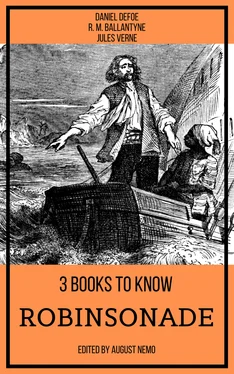One day, while Peterkin and I were seated beside our table, on which dinner was spread, Jack came up from the beach, and flinging down his axe, exclaimed:
“There, lads, the boat’s finished at last! So we’ve nothing to do now but shape two pair of oars, and then we may put to sea as soon as we like.”
This piece of news threw us into a state of great joy; for although we were aware that the boat had been gradually getting near its completion, it had taken so long that we did not expect it to be quite ready for at least two or three weeks. But Jack had wrought hard and said nothing, in order to surprise us.
“My dear fellow,” cried Peterkin, “you’re a perfect trump! But why did you not tell us it was so nearly ready? Won’t we have a jolly sail tomorrow, eh?”
“Don’t talk so much, Peterkin,” said Jack; “and, pray, hand me a bit of that pig.”
“Certainly, my dear,” cried Peterkin, seizing the axe. “What part will you have? A leg, or a wing, or a piece of the breast — which?”
“A hind leg, if you please,” answered Jack; “and, pray, be so good as to include the tail.”
“With all my heart,” said Peterkin, exchanging the axe for his hoop-iron knife, with which he cut off the desired portion. “I’m only too glad, my dear boy, to see that your appetite is so wholesale, and there’s no chance whatever of its dwindling down into retail again — at least, in so far as this pig is concerned. — Ralph, lad, why don’t you laugh, eh?” he added, turning suddenly to me with a severe look of inquiry.
“Laugh!” said I. “What at, Peterkin? Why should I laugh?”
Both Jack and Peterkin answered this inquiry by themselves laughing so immoderately that I was induced to believe I had missed noticing some good joke, so I begged that it might be explained to me; but as this only produced repeated roars of laughter, I smiled and helped myself to another slice of plantain.
“Well, but,” continued Peterkin, “I was talking of a sail tomorrow. Can’t we have one, Jack?”
“No,” replied Jack, “we can’t have a sail; but I hope we shall have a row, as I intend to work hard at the oars this afternoon, and if we can’t get them finished by sunset, we’ll light our candle-nuts, and turn them out of hands before we turn into bed.”
“Very good,” said Peterkin, tossing a lump of pork to the cat, who received it with a mew of satisfaction. “I’ll help you, if I can.”
“Afterwards,” continued Jack, “we will make a sail out of the cocoa-nut cloth, and rig up a mast; and then we shall be able to sail to some of the other islands, and visit our old friends the penguins.”
The prospect of being so soon in a position to extend our observations to the other islands, and enjoy a sail over the beautiful sea, afforded us much delight, and after dinner we set about making the oars in good earnest. Jack went into the woods and blocked them roughly out with the axe, and I smoothed them down with the knife, while Peterkin remained in the bower spinning, or rather twisting, some strong, thick cordage with which to fasten them to the boat.
We worked hard and rapidly, so that when the sun went down Jack and I returned to the bower with four stout oars, which required little to be done to them save a slight degree of polishing with the knife. As we drew near we were suddenly arrested by the sound of a voice. We were not a little surprised at this — indeed, I may almost say alarmed; for although Peterkin was undoubtedly fond of talking, we had never, up to this time, found him talking to himself. We listened intently, and still heard the sound of a voice as if in conversation. Jack motioned me to be silent, and advancing to the bower on tiptoe, we peeped in.
The sight that met our gaze was certainly not a little amusing. On the top of a log which we sometimes used as a table sat the black cat with a very demure expression on its countenance, and in front of it, sitting on the ground with his legs extended on either side of the log, was Peterkin. At the moment we saw him he was gazing intently into the cat’s face, with his nose about four inches from it, his hands being thrust into his breeches pockets.
“Cat,” said Peterkin, turning his head a little on one side, “I love you!”
There was a pause, as if Peterkin awaited a reply to this affectionate declaration. But the cat said nothing.
“Do you hear me?” cried Peterkin sharply. “I love you — I do! Don’t you love me?”
To this touching appeal the cat said “mew” faintly.
“Ah, that’s right! You’re a jolly old rascal! Why did you not speak at once, eh?” and Peterkin put forward his mouth and kissed the cat on the nose!
“Yes,” continued Peterkin after a pause, “I love you. D’you think I’d say so if I didn’t, you black villain? I love you because I’ve got to take care of you, and to look after you, and to think about you, and to see that you don’t die —”
“Mew, me-a-w!” said the cat.
“Very good,” continued Peterkin; “quite true, I have no doubt. But you’ve no right to interrupt me, sir. Hold your tongue till I have done speaking. Moreover, cat, I love you because you came to me the first time you ever saw me, and didn’t seem to be afraid, and appeared to be fond of me, though you didn’t know that I wasn’t going to kill you. Now that was brave, that was bold, and very jolly, old boy, and I love you for it — I do!”
Again there was a pause of a few minutes, during which the cat looked placid, and Peterkin dropped his eyes upon its toes as if in contemplation. Suddenly he looked up.
“Well, cat, what are you thinking about now? Won’t speak, eh? Now tell me: don’t you think it’s a monstrous shame that those two scoundrels, Jack and Ralph, should keep us waiting for our supper so long?”
Here the cat arose, put up its back and stretched itself, yawned slightly, and licked the point of Peterkin’s nose!
“Just so, old boy; you’re a clever fellow. — I really do believe the brute understands me!” said Peterkin, while a broad grin overspread his face as he drew back and surveyed the cat.
At this point Jack burst into a loud fit of laughter. The cat uttered an angry fuff and fled, while Peterkin sprang up and exclaimed:
“Bad luck to you, Jack! You’ve nearly made the heart jump out of my body, you have!”
“Perhaps I have,” replied Jack, laughing, as we entered the bower; “but as I don’t intend to keep you or the cat any longer from your supper, I hope that you’ll both forgive me.”
Peterkin endeavoured to turn this affair off with a laugh. But I observed that he blushed very deeply at the time we discovered ourselves, and he did not seem to relish any allusion to the subject afterwards; so we refrained from remarking on it ever after, though it tickled us not a little at the time.
After supper we retired to rest, and to dream of wonderful adventures in our little boat and distant voyages upon the sea.
THE BOAT LAUNCHED — We Visit the Coral Reef — The Great Breaker that Never Goes Down — Coral Insects — The Way in which Coral Islands are Made — The Boats Sail — We Tax Our Ingenuity to Form Fish-Hooks — Some of the Fish We Saw — And a Monstrous Whale — Wonderful Shower of Little Fish — Waterspouts.

IT WAS A BRIGHT, CLEAR, beautiful morning when we first launched our little boat and rowed out upon the placid waters of the lagoon. Not a breath of wind ruffled the surface of the deep. Not a cloud spotted the deep-blue sky. Not a sound that was discordant broke the stillness of the morning, although there were many sounds — sweet, tiny, and melodious — that mingled in the universal harmony of nature. The sun was just rising from the Pacific’s ample bosom, and tipping the mountain-tops with a red glow. The sea was shining like a sheet of glass, yet heaving with the long, deep swell that, all the world round, indicates the life of Ocean; and the bright seaweeds and the brilliant corals shone in the depths of that pellucid water, as we rowed over it, like rare and precious gems. Oh, it was a sight fitted to stir the soul of man to its profoundest depths! and if he owned a heart at all, to lift that heart in adoration and gratitude to the great Creator of this magnificent and glorious universe!
Читать дальше













